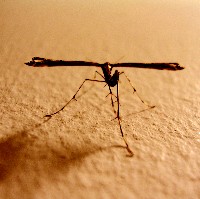 Researchers at Vanderbilt University in Nashville, Tennessee have developed a new type of insect repellant that they say is more effective than current products on the market. Their results appear online in the Proceedings of the National Academy of Sciences (paid subscription required).
Researchers at Vanderbilt University in Nashville, Tennessee have developed a new type of insect repellant that they say is more effective than current products on the market. Their results appear online in the Proceedings of the National Academy of Sciences (paid subscription required).
The new type of repellant, from the lab of biology and pharmacology professor Laurence Zwiebel, works on all types of insects, including mosquitoes, as well as flies, moths and ants. The university has filed for a patent on this class of compounds and is discussing potential licensing deals that lead to commercial products. However, the university says it is keeping a special focus on development of products to reduce the spread of malaria in the developing world.
The compounds developed by Zwiebel’s team affect the insects’ sense of smell through a newly discovered molecular channel. In the past few years, scientists have learned that the olfactory system of mosquitoes and other insects is much different from mammals. In insects, conventional odorant receptors (ORs) do not act autonomously. Instead, they form a complex system with a co-receptor called an Orco that is also required to detect odorant molecules.
ORs are spread all over the insects’ antennae and each responds to a different odor. To function, however, each OR must be connected to an Orco that switches on when it detects its specific odor — such as for blood — to alert the insect’s brain. Zwiebel’s approach is to stimulate the Orcos directly, to turn them on all at once, and overload the insect’s olfactory system, effectively shutting down its ability to find blood.
The challenge facing Zwiebel’s team was to find chemicals that affect insects’ olfactory systems, particularly the OR-Orco complexes. For this task, they made use of Vanderbilt’s high-throughput screening system, a technology designed for drug discovery.
Vanderbilt’s system uses human embryonic kidney cells, which the researchers genetically engineered with mosquito odorant receptors. They then tested these cells against a commercial library of 118,000 small molecules normally used in drug development.
While several molecules stimulated mosquito ORs, one compound emerged as the most consistent stimulator of OR-Orco complexes, and thus addresses both the odor receptor and the insect’s co-receptor. They called this compound Vanderbilt University Allosteric Agonist or VUAA1. The researchers found that VUAA1 activates OR-Orco complexes not only for mosquitoes, but also for flies, moths and ants.
Read more: Gates Foundation Grants $50M for New Insecticides
Photo: Germán Meyer/Flickr
* * *

 RSS - Posts
RSS - Posts
[…] Read more: New Class of Insect Repellant Developed, Patent Filed […]